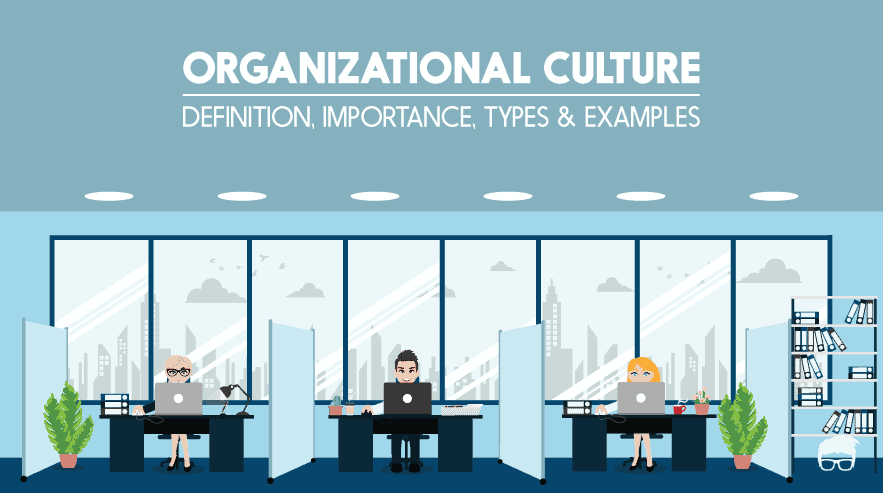The employees in an organisation make up its most valuable asset and there exists a set of beliefs, assumptions and habits that these employees establish and adapt over time with experience. This shared system of ideas and behaviours helps create a culture within the organisation and is often referred to as organisational culture.
What Is Organisational Culture?
Organisational culture is a powerful system of shared norms and attitudes that works as a homogenising factor for an organisation’s employees and gets appropriated by them.
In simple terms, organisational culture is a system of shared assumptions, values, beliefs, and norms that govern how an organisation’s employees behave in the organisation.
This culture says a lot about an organisation’s practices and the activities it entertains. It has its basis in the unwritten and written rules of a company. Over time, employees connect with each other and start to identify themselves with this system while also driving the culture forward and making necessary changes as and when required. And thus, existing culture can determine if an organisation is worth working for and therefore, the right culture attracts new employees.
Why Is Organisational Culture Important?
Over recent times, competitive organisations have given a good deal of importance to the maintenance of a healthy culture, for it enables:
- The unification of employees. A healthy culture helps the employees, very often from different backgrounds, interact better among themselves and build a mutual understanding when undertaking several tasks. A culture also improves an employee’s loyalty towards the company on an individual level, and the person may want to work harder. The importance of organisational culture can be felt when its ability to guide and motivate the employees helps the organisation scale new heights.
- The creation of momentum within the organisation. A culture often sets out to serve as the driving force behind a business’ strategy and may lead to its competitive advantage. The determinants for the sustainable building of this momentum are –
- The nature of the culture.
- Seriousness within employees.
- Recognition of leaders and their effectiveness.
It gives a sense of direction to the employees and leads to business success.
- The building of an identity of the organisation. Organisational culture has a key role in creating and maintaining the brand identity of the organisation for the employees and also for the outsiders.
Characteristics Of Organisational Culture
There are a few inherent elements of organisational culture.
- It is an undefined and ingrained aspect of an organisation. There exists no universal definition that can be followed in order to develop such a culture. It is more understood and less directed. It lies entangled with the complete hierarchal and functional structure of the organisation and can only be evolved but never be fundamentally changed.
- It is ever-changing. While a certain environment may seem pleasant to some employees, others might not find it suitable. Also, it may not cater to all the needs of the organisation at all times and hence, it keeps on changing and renewing itself.
- It depends on the company’s principles and goals. It can vary for different organisations depending upon their core values and beliefs and the ways they undertake to achieve certain goals. The degree of urgency given to tasks shapes organisational culture. A lot depends on what the organisation wishes to place first, its employees or its tasks.
- It tends to have a variety of ways to manifest itself. Culture can demonstrate itself in various ways, from communication techniques to research methods, from corporate merrymaking to leadership behaviours. Also, while some organisations develop their culture keeping in mind the traditional levels of authority, others may wish to alter it by their cultures and subcultures.
But, keeping aside the wide range of things that can be good or bad, an organisation emphasises a certain set of values, called the values of organisational culture. These values include dependability, reliability, consistency, commitment, efficiency, and honesty, which will result in having team-oriented, goal-oriented employees working in healthy competition. - It can sustain subcultures within itself. Organisational subculture is developed when a subgroup of employees, divided on the basis of tenure, identity, departmental designations etc. shares a set of values within themselves which may or may not align with the dominant culture’s values. Subcultures provide flexibility by bringing forth several responses to any single measure, without disturbing the overall working of an organisation. This makes way for a proper and timely evaluation of any order from the seat of authority and makes the organisation ready to adopt measures according to changing environments, while not being limited to just a single set of values.
Types Of Organisational Culture
Culture in an organisation depends on the working model that a company opts to have. According to the Quinn and Cameron framework model, designed and developed at the University of Michigan, there exist four parameters which break organisational culture into four distinct types.
- Clan culture – When an organisation wishes to have internal integration and coordination by sharing a less competitive and a more family-like environment, the culture developed is called Clan Culture.
- Adhocracy culture – When an organisation works flexibly and lays emphasis on individual innovation and thereby empowers its employees, while also committing to external demands, the culture thus developed is called adhocracy culture.
- Market culture – Market Culture is the most capitalistic of all cultures, it exists when the employees in an organisation work in stability but with a competitive spirit to achieve better results in the market and make more profit.
- Hierarchy culture – When management is done by a hierarchal structure to maintain stability and control within an organisation and leads to better coordination among employees, the culture is called Hierarchy Culture.
An organisation, at a given time, may demonstrate traits from any of the four types of culture, depending on its strategy and challenges. It is never fixed and varies with time as well as department types, in the organisation.
Examples Of Organisational Culture
If an organisation is to succeed, it’s important to have a culture that brings out the best in the employees by constantly motivating them. It’s not always the perks and benefits that form a culture but how the employees in an organisation are managed and made to work. Following are a few examples of unique organisational cultures.
- CB Insights helps companies make decisions by providing them with factual analysis. For this purpose, CB Insights ensures that its employees are well updated with the evolved technology. And thus, it offers its employees with additional education stipend for the same. Managers at CB Insights care about the personal and professional growth of the employees under them and provide them with a challenging environment. This helps a company achieve its goals while also ensuring the well-being of the employees.
- FloQast, an accounting software vendor company, maintains a very transparent culture where it allows its employees to ask for any sort of information regarding the company. All levels of management work transparently and openly and it encourages open conversations and the development of trust and loyalty towards the company.
- At Evive, a company which provides predictive analytics, the employees, in order to minimise their ecological footprint, have taken an initiative to go green, within the company and also outside, by volunteering at several local NGOs. This practice of making an impact, at a larger level, and striving to create a better world has shaped the company’s culture.
Final Thoughts
Organisational cultures are never developed overnight. It requires efforts from the employees as individuals and as a team to help create a culture. Also, cultures keep evolving as the company meets new challenges but have their basis in the written and the unwritten rules of the company, often set by the founder. What becomes important is to keep a check on the culture the company has adopted by continually analysing its good and bad effects. A weak or bad organisational culture tends to make an organisation seem disingenuous.
Go On, Tell Us What You Think!
Did we miss something? Come on! Tell us what you think about our article on organisational culture in the comments section.
A startup consultant, digital marketer, traveller, and philomath. Aashish has worked with over 20 startups and successfully helped them ideate, raise money, and succeed. When not working, he can be found hiking, camping, and stargazing.









